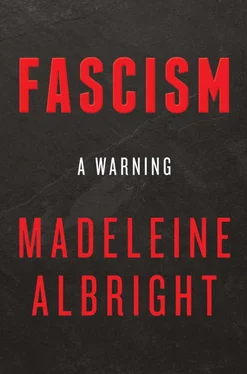Trump has been voicing similar opinions for decades so his sincerity cannot reasonably be questioned, but his approach is that of a demagogue. His analysis is filled with full-throated assertions that are riddled with bunkum and his arguments are designed to exploit insecurities and stir up resentment. A speaker with a more objective approach might have noted the decline in Pennsylvania’s unemployment to below 5 percent, from 8 percent a few years earlier, and the more than 200,000 jobs in the state that are supported by exports, largely to Canada, Mexico, and China. Nationally, between 2009 and 2016, inflation remained low, the jobless rate declined by more than half, and the U.S. workforce grew by twelve million. Trump inherited an economy that, among countries larger than Switzerland, was the world’s most competitive. There is always room for improvement, but the picture the president paints of an America that has been losing in negotiation after negotiation is simply false. His apparent intention, therefore, is not to address and alleviate anger, but to inflame it.
THE ARCHITECTS OF THE TRUMP ADMINISTRATION’S FOREIGN policy use two labels to describe the structure they have built: “Principled Realism” and “Putting America First.” Principled Realism is merely a slogan; America First is a slogan with a past. Founded in 1940, the America First Committee (AFC) brought together pacifists, isolationists, and Nazi sympathizers to fight against the country’s prospective entry into World War II. The AFC opposed creation of the Selective Service and also a Roosevelt initiative, known as Lend-Lease, to keep the British in food and arms as they struggled to survive the German onslaught. Within twelve months of its founding, the committee had built a membership of more than 800,000 and attracted support from across the political spectrum—corporate tycoons and Socialists alike. Contributing mightily to its popularity was the famed aviator Charles Lindbergh, who worried that Jewish influence was pushing the country into a conflict it did not, in his view, have reason to fight.
Four days after the Japanese attack on Pearl Harbor, Hitler declared war on the United States. The AFC soon disbanded and, in the intervening decades, its name has carried the stigma of naïveté and moral blindness. Now “America First” is back—but what does it mean?
The president says that “every decision on trade, on taxes, on immigration, on foreign affairs, will be made to benefit American workers and American families.” At the UN, he declared, “I will always put America first, just like you, as the leaders of your countries, will always and should always put your countries first.” This premise—that every nation can be expected to look out for its own interests—is hardly a revelation. Who would assume anything different? What the assertion ignores is the stake that all countries have in the fates of others. Lindbergh was willing to live with a Nazi-dominated Europe because he saw that as preferable to the risks and costs of war. What if his view had prevailed and the Third Reich still ruled? Would that really have served America’s interests?
Trump’s top advisers have praised him for his “clear-eyed outlook that the world is not a ‘global community’ but an arena where nations, nongovernmental actors and businesses engage and compete for advantage.” This formulation puzzles because, although it’s fair to say the world isn’t exactly Sesame Street, it is a place where people from all countries must live. To reduce the sum of our existence to a competitive struggle for advantage among more than two hundred nations is not clear-eyed but myopic. People and nations compete, but that is not all that they do. Imagine a small town in America or a village in Africa or a city in Asia where there is no sense of community, no sharing of responsibility, no looking out for the other guy—just a grim daily fight to “win” at the expense of neighbors. Whose interests would that put first?
Globally, there is hardly an economic, security, technological, environmental, or health-related challenge that any country can better address alone than through a joint effort with neighbors. It is the duty of diplomats to foster that cooperation. Trump’s view of life as a wilderness of Darwinian dogfights doesn’t correspond to the intricately interdependent world in which we must frequently join forces if we are to make the best of our lot.
Responsible governments understand this, but responsible governments aren’t the ones that cause the most pain. Designating “(Fill in the blank) First” as the golden rule of international relations provides an all-purpose justification for tyrants to do as they like. What is Pyongyang’s rationale for building nuclear weapons if not to put North Korean interests first? By annexing Crimea, Putin placed Russian desires above international law. Why, if not for its own benefit, does Iran intervene in the affairs of its neighbors? For centuries, imperial powers perpetrated physical and economic atrocities against colonial populations to exalt their own countries and monarchs. Hitler invaded Czechoslovakia to help the Fatherland “compete for advantage.” Underlying Fascism is the theory that nations are entitled to take what they want for no other reason than that they want it. There are better golden rules.
A second source of blurriness in Trump’s vision is that it offers no incentive for friendship. If every nation is focused entirely on gaining an edge over every other, there can be no trust, no special relationships, no reward for helpfulness, and no penalty for cynicism—because cynicism is all we promise and all we expect. This attitude explains the president’s peculiar view of NATO as a protection scheme in which the United States is “owed” billions of dollars for supposedly hiring out its armed forces to provide security for others. Personally, I have never conceived of NATO as a business proposition; it is something far more valuable. The Alliance is a unique political and military arrangement that for more than seven decades has allowed Europe and the United States to prepare, train, share intelligence, and fight against common dangers. It’s the cornerstone of world peace and a living testament to our collective will; you can’t put a price on that.
The course I teach at Georgetown is about the tools of foreign policy and how to use them. From what I’ve seen, the president would have a hard time passing it. He considers himself a master at bluster and bluff, which can be an effective tactic, when applied sparingly. During the Cold War, Henry Kissinger tried to pry concessions out of the Soviets by suggesting that Nixon was a little crazy and that there was no telling what he might do if he didn’t get his way. Given Trump’s undisciplined style, a similar strategy now would certainly have the advantage of credibility. Trump can seem unhinged. But unpredictability is a trait, not a strategy. The question is whether the president’s penchant for insults and off-the-wall threats is linked to a plan for making progress toward specific national security objectives.
If so, how well is that plan working? Are key foreign leaders seeking to mollify Trump by becoming more supportive of U.S. goals, or are they tuning him out and negotiating their own agreements? Is the president persuading others to follow him, or is he being manipulated into echoing the agendas of others, as, for example, Saudi Arabia in the Middle East? In a craft requiring experience, sound judgment, and the vision to understand the impact of today’s decisions on tomorrow’s world, how well is Trump measuring up when compared to his peers?
As in most arenas, foreign policy perceptions help to shape foreign policy outcomes. I, for one, do not foreclose the possibility that the president’s brash disregard for diplomatic convention might, in some cases, be exactly what’s needed to awaken people to new possibilities. No one who has been in a position of trust, including myself, can look back at their time in office without regret at the many problems left unsolved. Maybe Trump does have the answer, as he has claimed, to forging better trade agreements, securing Arab-Israeli peace, ending North Korea’s nuclear program, and combatting violent extremism. I hope he does.
Читать дальше
Конец ознакомительного отрывка
Купить книгу












